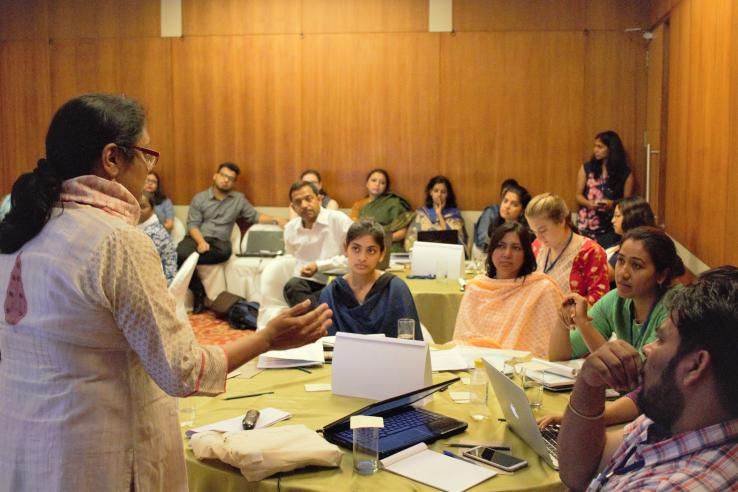Evaluating Social Programmes 2024
Partners:

Evaluating Social Programmes (ESP) 2024 is a five-day in-person course that explores why and how randomised evaluations can be used to rigorously measure social impact. It explores methods and considerations for the design and implementation of randomised evaluations, and how findings can inform evidence-based policies and programmes for better development outcomes.
The course dates will be announced shortly. Dates shown above are tentative. Applications will be opened soon.
About the Course
CLEAR/J-PAL South Asia’s Executive Education: Evaluating Social Programmes is a five-day workshop designed to provide development practitioners, policymakers, and researchers with a thorough understanding of randomised evaluations and how they can be used to rigorously measure impact and inform policy.
ESP 2024 offers participants a clear introduction to the impact evaluations of social programmes using randomised controlled trials, when decision-makers might choose to conduct them, and how these evaluations are designed in real-world settings.
ESP 2024 will be led by J-PAL affiliated researchers based in leading universities around the world and senior CLEAR/J-PAL South Asia staff. Lectures will be supplemented by group discussions of context-specific case studies led by CLEAR | J-PAL South Asia staff, providing participants the chance to forge connections with peers. Participants will also have the opportunity to design and present their own impact evaluations using the concepts taught, and discuss their learnings from ESP 2024 with senior CLEAR | J-PAL South Asia staff through dedicated networking sessions.
View the sample agenda to determine the applicability of this course to your learning needs.
Course Focus
Participants can expect to:
- Unpack the fundamentals of measuring impact using tools and processes such as needs assessments, logical frameworks, and theories of change.
- Build an understanding of why and when social programmes need to be evaluated, and the different roles that systematic monitoring and evaluation can play in non-profits, social enterprises, and government organisations.
- Gain insight into how real-world randomised evaluations are designed and implemented by understanding:
- What factors can affect the effectiveness of an evaluation
- How sample sizes for evaluations are decided
- How evaluations can feed into a programme’s cost-effectiveness
- Develop organisational strategies to assess the impact of social programs and policies, and evaluate the applicability and scalability of research findings to optimise resource allocation and drive positive societal change.
- Engage with a vibrant community of leaders, decision-makers, and practitioners from across various domains and specialisations to harness their collective expertise and support in designing, planning. and implementing rigorous evaluations for social good.
Informational Webinar + Q&A Session
CLEAR | J-PAL South Asia will be hosting a virtual Informational Webinar and Q&A session. The dates and timings will be announced soon.
Through this session, participants can learn more about
- Course content
- Suitability for this course
- Selection criteria for applicants
Interested applicants will have an opportunity to ask questions before they submit applications. Registrations will open soon.
Who can apply?
This course is designed for organisations and individuals working on scalable social impact solutions. This includes mid to senior-level practitioners, decision-makers at international or local development organisations and social enterprises, donors, government and other non-governmental organisations. However, early-career professionals and students are also welcome to apply.
The course is intended for leaders and practitioners who are interested in understanding how they can strengthen their organisations’ programmes, optimise resource allocation, scale effective solutions, and rigorously measure the social impact of their work.
Only individuals working or studying in South Asia (Afghanistan, Bangladesh, Bhutan, India, Maldives, Nepal, and Sri Lanka) are eligible to apply to this in-person training course. Interested individuals in Pakistan are encouraged to apply to the Evidence-Based Program Design workshop organized by Centre for Economic Research in Pakistan (CERP).
Applications will be opened soon.
Scholarships
CLEAR/ J-PAL South Asia is offering one scholarship spot for student applicants to attend ESP 2024. The scholarship consists of either a partial or full fee waiver based on criteria determined by CLEAR/J-PAL South Asia and discretion of the organisers. Student applicants who are shortlisted for the scholarship may have to go through an additional screening and interview process.
The scholarship will only cover the cost of the course fee. It will not cover travel, accommodation, food etc expenses in Bengaluru during the workshop. Students who are awarded the scholarship will have to make their own arrangements for the same) and is open only for individuals who are currently enrolled in full-time undergraduate, graduate, or doctoral studies in India.
Please note that CLEAR/J-PAL South Asia will award no further funds beyond the above scholarship.
Fee Structure
The fee structure for ESP 2024 is as follows:
| Organisation Type | Course Fee |
| Multilateral / Social Enterprise / For-profit / Foundations / Donors | INR 1,10,000 |
| NGO/Non-Profit | INR 65,000 |
| Government / Academic Institutions | INR 55,000 |
| Individual Researchers / Individuals without organisational affiliation / Students | INR 45,000 |
Disclaimers
- Please note that the classification of organisations and course fee amount determined will be subject to provision of adequate supporting documentation by the applicant. The final decision regarding the course fee amount for an applicant will be with CLEAR/J-PAL South Asia.
- Certificates will only be awarded to participants who attend all the sessions, group activities and submit the final presentation. Thus, attendance throughout the course is mandatory. Exceptions to this rule (if any) can be made on a case by case basis for unforeseen circumstances, the decision for which shall be taken by the course organisers.
- The session recordings (if any) will be made and used for only internal review purposes, and will not be made available to the participants. No requests for such recordings will be entertained.
Cancellation
Cancellation Policy will be updated shortly.
Please reach out to Bhakti Bhowmik ([email protected]) for any questions, queries, and support.
